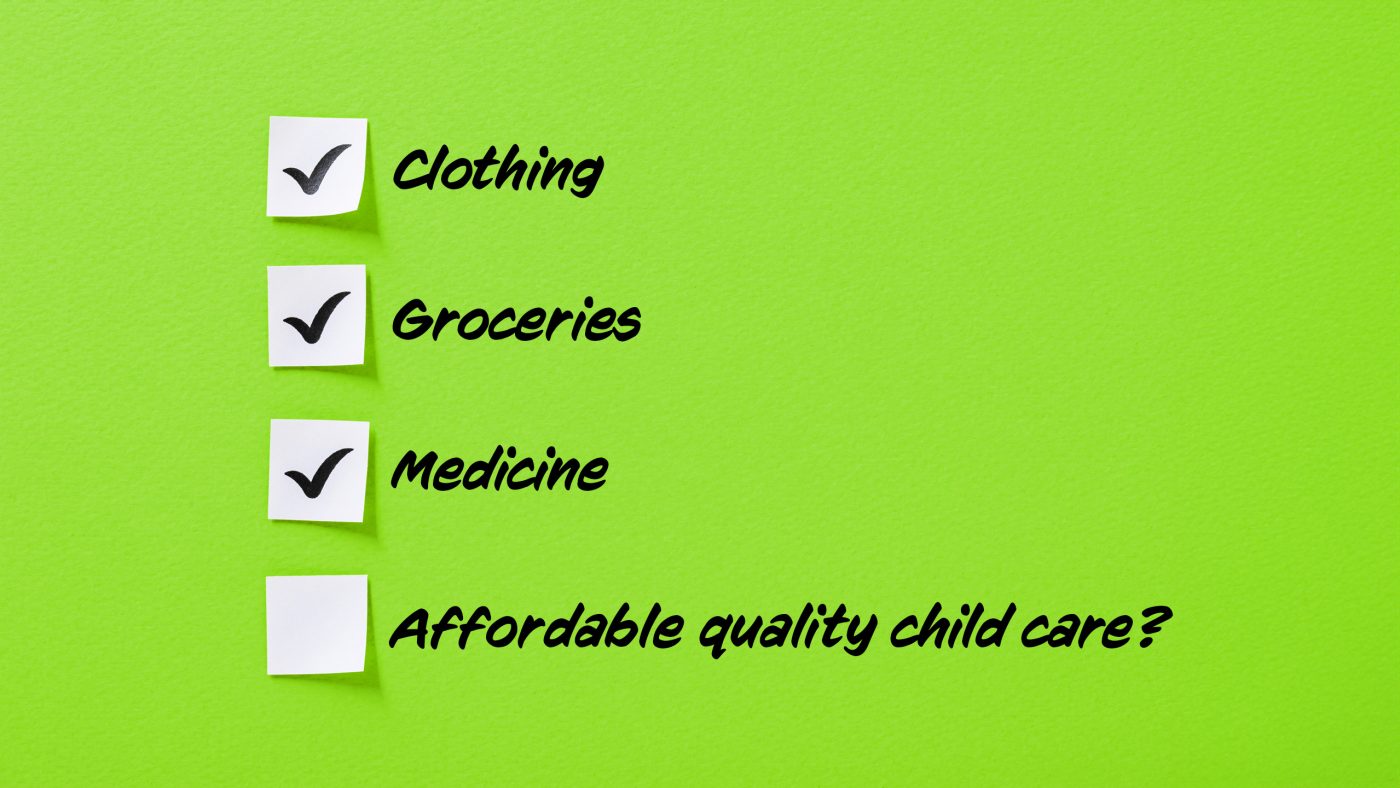Elliot’s Provocations unpacks current events in the early learning world and explores how we can chart a path to a future where all children can flourish. Regarding the title, if you’re not steeped in early childhood education (ECE) lingo, a “provocation” is the field’s term—taken from the Reggio-Emilia philosophy of early education—for offering someone the opportunity to engage with an idea.
We hope this monthly column does that: provocations are certainly not answers, but we hope Elliot’s Provocations helps you pause and consider concepts in a different way.
If you’ve been following my work at all, you know a consistent theme is that we need to position child care—and care more generally—as a deep-set value, rather than a utilitarian service. I am so convinced of this thesis that I have an entire book on it coming out next year!
While I often disagree with his conclusions, Matthew Yglesias is a smart pundit who offers his own useful provocations. He also has a big following among influential policymakers and thought leaders, making his opinions something of a public mirror to what many in the halls of power are quietly thinking. In his column, “Rebooting the care agenda,” Yglesias argues that the rhetorical reliance on child care’s job-supporting prowess (both in terms of creating jobs within the care sector itself, and job creation more broadly) no longer holds water. He writes, “The main problem is that most of Democrats’ ideas about investing in the care economy were formulated in the shadow of the Great Recession and were framed, in part, as ways of putting people back to work…Today, though, we are clearly back to full employment.”
As an empirical matter, Yglesias is correct. What’s more, the labor force participation rates of mothers of young children—aka the group most acutely impacted by child care challenges—is at historic highs. (I have argued before, and plan to go deeper in a future article, about how this can be a gloss: attachment to employment says little about the sacrifices to well-being required to work without a stable and satisfactory child care arrangement). But Yglesias takes this starting point and goes in a troublesome direction. He writes, citing pro-care arguments by the Roosevelt Institute’s Suzanne Kahn:
It’s true, that if the economy is deeply depressed, the care sector is a “good investment” in the sense of creating a lot of labor demand per dollar spent. But the economy isn’t deeply depressed, so this is actually a huge logistical problem with the idea of expanding access to care. You could, of course, try to make care work less labor-intensive, but Kahn argues against that, saying “strict staffing ratios should be maintained for those receiving government funds.”
She also wants to ensure that unit labor costs not only stay high but become higher, calling for “strict minimum wages and benefits packages set at family-sustaining levels, as well as protections for workers’ ability to organize.” She wants to discourage private equity investment in the care sector by banning stock buybacks and “demanding that corporate boards receiving significant federal care funds include both recipients of the care and caregivers as representatives.”
…This is an agenda for what my [Libertarian think tank] Niskanen Center friends call “cost-disease socialism,” where you respond to the high cost of something by subsidizing it, but then attach strings that limit the supply and drive costs up further.
There are faulty premises here, almost all of which start from confusion over what and who child care is for. Yglesias seems relatively disinterested in the impact of care investments on the quality of care, other than a brief aside about child-to-adult ratios where he links to a single paper from the deeply pro-free-market Mercatus Center. There is no engagement with the body of research that shows the greatest predictor of quality is the presence of a stable, warm caregiver; that child care educator churn is sky-high and by far the highest in for-profit programs (presumably due to working conditions). There is no engagement with the question of whether those caring for toddlers should rightly be paid akin to dog walkers and parking lot attendants, or why elementary school teachers should receive vastly higher wages and benefits. There is no engagement with what might happen if we let private equity fully swoop into child care, given the wreckage they have left behind in other human service sectors like nursing homes and autism services.
Most worryingly, though, is that Ygelsias—and he is far from alone in this—fails to see that care has inherent characteristics that set it apart from other goods. He writes, in a paragraph that simultaneously contains an important truth and a massive misunderstanding:
That doesn’t mean there are no problems in the space of child or care, but I do think it makes a difference to realize that there isn’t necessarily a “crisis.” The reason to address child care costs is that families like to have more money rather than less, so if you can help them out in this regard, they’ll be better off. But parents of young kids buy all kinds of stuff—groceries, car seats, clothing—and as intense as the prime daycare years are, they are only a small fraction of a child’s life and a modest share of the all-in expense of raising a child. Making child care more affordable would help young families, but so would reducing minimum lot size rules to create more single-family homes. So would allowing mid-rise single-staircase apartments to create more cheap three-bedroom floorplans. If you’re focused on the problem (the cost of living for parents of young children) rather than the policy silo (child care), then you have a lot of options that don’t face the particular sticky problems of care-oriented industrial policy.
The important truth is that the family policy space is overly siloed. We weaken our impact by not making common cause with the full sweep of issues that impact a family’s overall life experience. In other words, our tendency to focus more on individual programs than comprehensive policy isn’t great. Housing and healthcare in particular have huge influences on family flourishing, as do items ranging from the built environment to car seat rules.
The massive misunderstanding is grouping child care with groceries, car seats and children’s clothing, as if it is merely one material need among many, as if the only problem is the monthly bill. Child care is an essential community support. Sociologist Mario Small has shown that child care programs are key sources of friendships and connectivity for new parents; like schools, they act as assets that enhance entire neighborhoods. Child care providers are among the most trusted sources of advice for those parents, as well. Many times, they act as full ‘alloparents’ (non-kin parental figures). In my new book I cite a moment in the documentary Make a Circle where a preschool teacher recalls how important his child care providers were as his family, headed by a single mother, struggled. “My mom was both my parents, and my other parent was my preschool teachers,” the teacher says. “They helped my mom when she needed assistance. They helped me. They helped my family. They, in essence, I feel, saved my life.”
I also think that semantic debates over what constitutes a “crisis” cheapens the human consequences. While it is definitely important that our policy analysis and projections be as careful and correct as possible, and while “crisis” language has mixed success, there is also a risk of going too far in the other direction. When parents are camping out overnight to try to get a child care slot, falling into poverty and eviction due to a lack of child care or choosing to not have more children due to child care, I’m not sure what the perfect word is, but it sure seems like a big problem. (I am not an expert on elder care or long-term supportive care, but my understanding is that they suffer from many of the same structural problems.)
And yes, that means we need to spend public money to increase supply, affordability and quality. But that’s not “cost disease,” that’s accepting that certain social goods are worth society’s coin. Allow me to quote from none other than William Baumol, the economist for whom “Baumol’s cost disease” is named: “No matter how painful rising medical and educational bills may be, society can afford them, and there is no need to deny them to ourselves or to the less affluent members of our society, or indeed to the world.” (italics his.) The real question is whether care belongs in that list: I say it does.
So, we do need to reboot the care agenda. We do need to recalibrate away from jobs-focused messaging. What we need is to position care as a national value and show how care bolsters child, family and community vibrancy. Then we’ll have a shared foundation upon which to do the difficult work of determining how best to pay for it.




